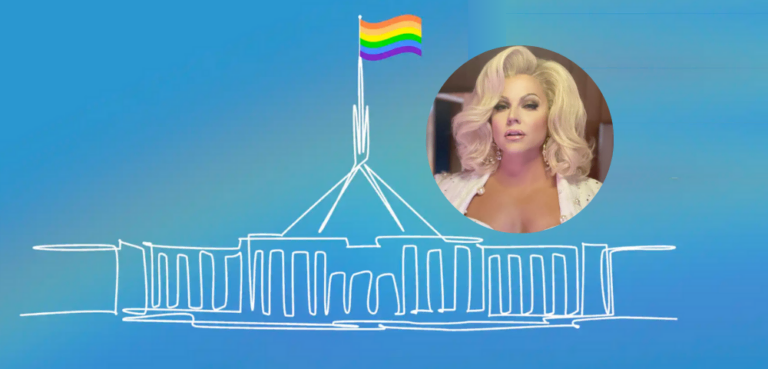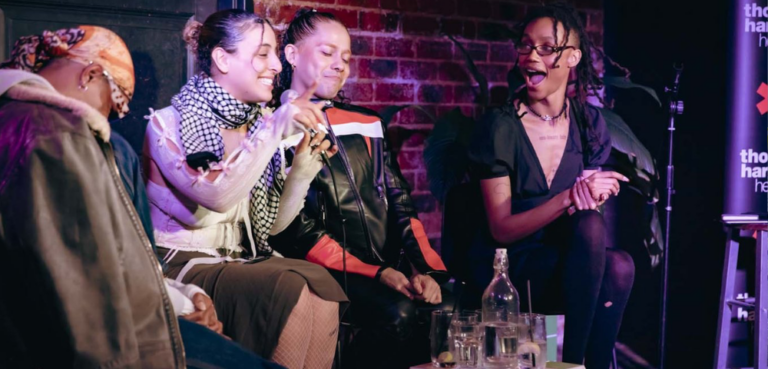
Queer siblings in Australia: the families we create are vital

Many sexual and gender diverse Australians form their own D-I-Y queer families to provide a much-needed sense of community and support. Others are lucky enough to find that solidarity with their own brother or sister. Matthew Wade spoke to a handful of queer siblings about how the families and bonds we create – biological or otherwise – are crucial.
LUCY AND ROSIE
Falling into a relationship with someone of the same sex as a teenager could be a daunting prospect for many sexual and gender diverse Australians, but Lucy Thomas had supportive family to help assuage any anxiety.
At home Lucy’s mum would always tell both her and her sister Rosie to be proud of who they were and to stand by their values, sentiments that made the embracement of a queer sexuality a relatively easy process.
“My sexuality was quite broad and open but it was very much wrapped up in what mum always highlighted to us, which was having integrity for who you are,” she said.
“For me I’m aware that that openness reflects a huge amount of privilege because many people don’t come from families where even one person is accepting.

“Ro and I are lucky that we were really close growing up and had such a close relationship with our mum.”
Lucy said she realised her sister Rosie was also same-sex attracted after she fell head over heels for one of the girls in Lucy’s friendship group in high school.
Rosie jokingly chalked the discovery of her own queer sexuality up to following in her big sister’s footsteps.
“Lucy’s my sister, so I copy everything she does,” she said. “At around 18 years old I was thinking are these feelings right, or am I taking this ‘copy the older sister’ thing too far?”
While the pair have always been supportive of each other’s identities, they admit that they weren’t initially as connected to Australia’s LGBTI community as they would have liked.
However, that changed after a joint professional endeavour saw the sisters co-found the anti-bullying organisation PROJECT ROCKIT more than ten years ago, which helps to create spaces where all young people have access to respect, acceptance, creative expression, and social leadership.
Lucy believes it helped propel the pair from sitting as backseat members of the community to frontrunners helping to hold a torch for queer rights around the country. She added that while having Rosie by her side has been invaluable, for many LGBTI Australians it’s about establishing a familial support network wherever you can source it.
“Our whole team marched at Mardi Gras last year, and for Ro and I who are both in same-sex relationships, it’s such a huge part of our identities,” she said.
“But it’s 2017 and I think family is so much more do-it-yourself than it was for us,” she said.
“We were lucky – my sister is my rock. But what we’ve seen over the past ten years is a real change in the way families look.”
Rosie agreed, saying despite her sexuality always being so unbelievably ‘normal’ for her, having Lucy has had an indisputable impact.
“It almost feels like we’re not just sisters. We’re allies, we’re co-founders, and we’re activists,” she said.
MOHSIN AND JASMINE
Despite being asked to see an ‘ex-gay’ school counsellor as a teenager questioning his sexuality, Mohsin Ali knew his same-sex desire wouldn’t dissipate.
He’d begun acknowledging his queer feelings during early adolescence however he didn’t truly embrace it until later in high school.
“Looking back I was proud of my strength to ignore what the counsellor stood for and to forge my own path, being true to myself,” he said.

This self-assuredness is something he said has remained robust throughout his life, though it didn’t prevent his shock at the news that his sister Jasmine was also queer when she came out to him while studying at university.
Up until that point he’d had no idea she identified as queer.
“It hit me like a bolt from the blue,” he said. “We went for a walk around Sydney one night and she told me – she asked for advice on whether or not she should tell our parents but I advised her against it as I didn’t see what the benefit would be.”
“Our parents have never been fully accepting so I didn’t want her to go through that. Our parents know, but it’s not something that’s discussed openly.”
At the time Mohsin was living in New Zealand and Jasmine in Sydney, so the revelation that both siblings were queer didn’t impact the pair as much as they believe it perhaps should have.
Each of their respective journeys around sexual identity had no substantial effect on each other’s at the time.
Jasmine said it wasn’t something they talked about a lot.
“I knew he was gay from a fairly young age, even though you don’t have a very good framework to understand those issues at the time,” she said.
“It didn’t really have an impact on me though – he was living in a different country, so it wasn’t something I talked about outside of my friendship group.
“But I guess now it does feel nice because you can share your personal lives and stories of intimacy and stuff, and that’s a nice supportive thing to have.”
Mohsin said while it’s rare the whole family can see each other at the same time because they live in separate states, he likes the fact that his sister shares a queer identity with him.
However, much of his connection to being queer and his support network has been sourced externally, through volunteering for community organisations and meeting like-minded members of the community.
“I do appreciate the solidarity Jasmine and I have,” he said.
“For an LGBTI-identifying person, having a supportive network is amazing.
“It helps you get through things that your family may not be able to understand or support. And because a lot of those bonds are self-chosen, they run deep.”
MICHAEL AND THOMAS
At the age of four Michael McDermott knew he was different but was too young to identify why that was: he just knew he had more stereotypically ‘feminine’ traits and socialised far better with girls.
With time this inkling developed into a deeper understanding that he was same-sex attracted and one afternoon when Michael’s father was driving him home from high school he came out to him as gay.
“My dad was really great and supportive and mum was similar, but initially I think it was more difficult for her to accept the kind of life she thought a gay man might lead compared to a straight man,” he said.
“When a baby is born you picture a certain life trajectory and when someone comes out it shatters that dream, at least temporarily.”

Michael said he slowly started to realise that his older brother Thomas was also same-sex attracted and had this perception validated when Thomas told the pair’s parents shortly after Michael had.
However, Thomas said he took several months to entirely reconcile the fact that both he and his brother identified as LGBTI.
“I remember kind of looking at Michael and thinking if he’s gay, that’s potentially going to be a tough blow to my parents, so I wasn’t as supportive as I could’ve been at the start,” he said.
“But I see sexuality as being very fluid and when I sat my father down and told him I was bisexual they were very supportive and told me they’d always love me.”
In recent times both have been quite actively involved in the community, with Michael volunteering at community organisations like the Melbourne Queer Film Festival and Bent TV, and Thomas volunteering to be a queer representative during his time at university.
Thomas said he’s proud of Michael’s involvement in the community and is happy that they share a queer sexuality.
“When I go to community events people will say ‘you’re Michael’s brother’ because he’s very involved, and I think it’s great,” he said.
“I think it’s cool he’s super passionate about it, and I know our parents would say the same. I’m very proud of him.”
Michael believes that having a supportive network, biological or otherwise, is critical for members of the LGBTI community.
“It’s crucial, it’s life or death for a lot of us,” he said.
“I feel lucky that for our parents it wasn’t difficult for them to come to terms with having children that weren’t straight.
“I love that our parents raised zero hetero children, I hope to do the same thing.”
KIRI AND REMY
Due to the dearth of visible queer women in Melbourne’s outer suburbs, it wasn’t until Kiri Sullivan was at university that she began learning about queer theory and discovering her own LGBTI identity in the process.
With the median age of people coming out seemingly decreasing with each passing year, she believes her journey was quite delayed.
“I never really made an announcement, I just gradually became more comfortable and open with being myself,” she said.

“I had a summer holiday fling overseas and told my friend about it, which was probably the closest to a formal ‘announcement’ that I got.”
It was around this time that her brother Remy began coming out as both queer and trans.
While he’d been quite visibly ‘queer’ in high school by means of not conforming to rigid gender lines, his transition didn’t formally start until the end of high school.
Remy said the exploration and acceptance of his queer sexual and gender identities was long and drawn out.
“Before puberty I started questioning my gender but then after puberty I started questioning my sexuality as well,” he said.
“It was like going from being bisexual, to lesbian, and then back to being bisexual.
“The internet and sites like Tumblr and YouTube helped me out a lot during that time, it made me feel more comfortable with my gender and sexuality.”
Having a sister that also identified as queer made Remy feel more comfortable discussing it.
“It was like oh yeah, I’m not the only queer in the family,” he said.
“It was something we were able to bond over, and we were able to go to queer events together.
“It’s nice having a family member who sees and gets you on that level, and is not always asking questions like you’re odd.”
Kiri reflected similar sentiments, saying that having the pair ‘united’ in a sense made her journey far easier and more comfortable.
“It would be so hard to be queer without anyone around you,” she said.
“It’s really important, both the friends you make and your family as well, if you’re lucky enough. It can make a big difference.
“We already feel like a family being in the queer community but having actual family as well feels really nice.”










